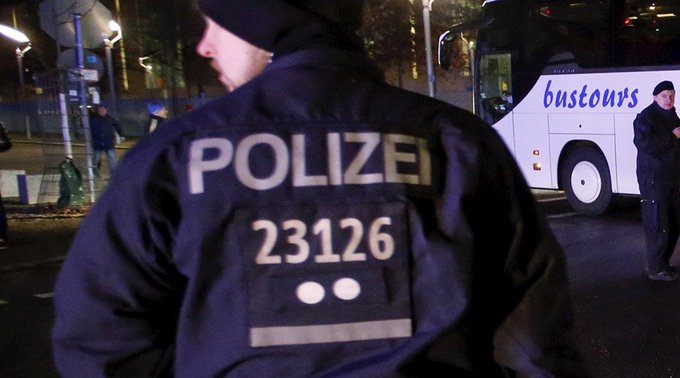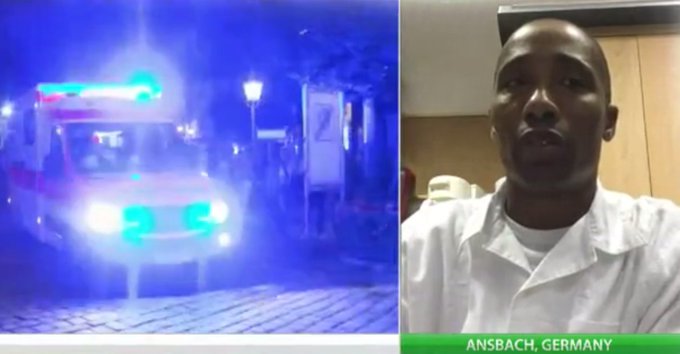Bavarian authorities have announced that the suspected suicide bomber, who was killed in the Ansbach explosion, was a 27-year-old Syrian whose asylum request was rejected last year. The motive behind the attack, which injured 12 people, remains unknown.
The suspect was first noticed by security staff at the Ansbach Open concert at around 9:45pm, police said in an updated statement. After he was refused entrance, the 27-year-old Syrian sat outside a local wine restaurant, where at about 10:10pm, according to the testimony of witnesses, the suspect leaned forward and detonated explosives.
Police added that the suspect has lived in Ansbach since July 2, 2015, and had a “criminal” history. A special commission with more than 30 people was established to handle the investigation.
The attacker was a 27-year-old Syrian who had entered the country about two years ago, but was refused asylum, Bavarian authorities told a press conference. His application was rejected a year ago but the man was allowed to stay in Germany temporarily, due to ongoing hostilities in Syria.
Man with a backpack was denied entry to #Ansbach music fest just before explosion - reports on.rt.com/7kek
Police say they do not yet known if the attacker had any radical Islamist background. The investigations is currently focused on attacker’s communications.
The suspect lived in a hotel in Ansbach, the minister said. He had tried to commit suicide two times and was previously housed in a psychiatric hospital. In the coming days, the investigation will focus on establishing whether the man acted with suicidal intent, Bavarian Interior Minister Joachim Herrmann told journalists.
So far, the investigation has found no evidence of an attempted political assassination or extremism, but such a possibility cannot be ruled out. The type of explosives detonated has not yet been established, but Hermann said that “metal parts”were apparently used in the improvised device.
A jihadist link cannot be excluded either, the minister said, since the presence of metal parts in the bomb indicates that the suspect had aimed to hurt as many people as possible.
‘Confusion, emergency vehicles all around’: #Ansbach resident talks after #Bavaria blast on.rt.com/7kf7
The Federal Office for Migration and Refugees will reveal why the suspect’s asylum application had previously been rejected later in the day Herrmann noted that those who are “seeking protection in Germany, must show full respect for the German legal system and the German population.”
The minister added that the attack demonstrated the need "to strengthen controls on those we have living in our country".
Following a press conference, Herrmann told Germany’s DPA, that he personally considers the bombing in Ansbach to have been the work of an Islamist suicide bomber.
"My personal opinion is that, unfortunately I think, it is very obvious that there has been a real Islamist suicide attack here,"Herrmann said early Monday.
Detonation occurred at the entrance music festival '#AnsbachOpen' in front of wine bar on.rt.com/7kem
“You never know the various motivations that can drive somebody to do something like this. That’s one of the difficulties that I think the intelligence and the security forces are around the world face[ing it] when it comes to a situation like this,” former CIA officer and international lawyer Jack Rice told RT.
“There are so many things that drive this but part of the problem is that you can see this copy-cat notion sort of spread out,”he added. “Think of it like throwing a stone into a pond. You can see this ripple effect start to spread out further and further and further. And what that has the potential of doing is motivating others who feel disaffected, who feel disenfranchised, who are confused, who are mentally ill, who are driven by anger…who are driven by just about anything else, who say, ‘I want to do something of consequence.”
With violence breaking out regularly across Europe the “trend of state of emergency throughout Europe” grows stronger, said geopolitical analyst from Patrick Henningsen.
“Anything that happens whether it is mugging or whether it is active violence it is being called terror and it’s being added into this progression of events. And it’s being highly hyper-politicized,” he added.
“Angela Merkel is under fire for anything that happens now. This is an incredible political situation in Germany right now. It’s a highly reactionary and highly irrational environment that the public is being herded into,” Henningsen added. “The migration issue in Germany is highly flammable and it may be the source of many problems, absolutely… But these violent events that we’re seeing here are not necessarily connected with that but they are being connected by the political classes, by the media and then the public will make those connections themselves.”
Detonation occurred at the entrance music festival '#AnsbachOpen' in front of wine bar on.rt.com/7kem
In the immediate aftermath of the attack there has been a “very easy tendency to pile on and blame the local authorities for not protecting the population,” political analyst Max Abrahms told RT. “But it’s particularly difficult in the case of Islamic State because these are people who are prepared to die. So they are not easily deterred. They are highly motivated. They are attacking in all sorts of places, not just symbolic targets, but large crowds”.
“In an all it just seems very happen-stance where in terms of the variety of terrorism, the background, the geographical diffusion of the attacks – all of this makes counter-terrorism extraordinarily difficult, especially against this lone-wolf sort of threat,” Abrahms added.





No comments:
Post a Comment